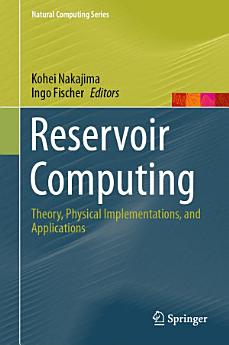Reservoir Computing: Theory, Physical Implementations, and Applications
Tentang eBook ini
The book is sub-structured into two major parts: theory and physical implementations. Both parts consist of a compilation of chapters, authored byleading experts in their respective fields. The first part is devoted to theoretical developments of RC, extending the framework from the conventional recurrent neural network context to a more general dynamical systems context. With this broadened perspective, RC is not restricted to the area of machine learning but is being connected to a much wider class of systems. The second part of the book focuses on the utilization of physical dynamical systems as reservoirs, a framework referred to as physical reservoir computing. A variety of physical systems and substrates have already been suggested and used for the implementation of reservoir computing. Among these physical systems which cover a wide range of spatial and temporal scales, are mechanical and optical systems, nanomaterials, spintronics, and quantum many body systems.
This book offers a valuable resource for researchers (Ph.D. students and experts alike) and practitioners working in the field of machine learning,artificial intelligence, robotics, neuromorphic computing, complex systems, and physics.
Tentang pengarang
Kohei Nakajima is an Associate Professor in the Graduate School of Information Science and Technology at the University of Tokyo. He received BS, MS, and PhD degrees from the University of Tokyo in 2004, 2006, and 2009, respectively. After obtaining his PhD, he spent five years as a post-doctoral fellow and a JSPS Postdoctoral Fellow for Research Abroad at the University of Zurich and at ETH Zurich in Switzerland. In 2013, he was awarded the title of the Hakubi researcher at Kyoto University, and until 2017, he was an Assistant Professor at the Hakubi Center for Advanced Research at Kyoto University. He was also a JST PRESTO researcher from 2015 to 2019. His research interests include nonlinear dynamical systems, information theory, reservoir computing, physical reservoir computing, and soft robotics.
Ingo Fischer has since 2009 been a Research Professor of the Spanish National Research Council (CSIC) at the Institute for Cross-Disciplinary Physics and ComplexSystems IFISC (UIB-CSIC) in Palma de Mallorca (Spain). Moreover, he is head of the University group ‘Experimental Physics of Complex Systems’ at the Universitat de les Illes Balears (UIB) and currently Deputy Scientific Director of the Maria de Maeztu Unit of Excellence on ‘Information Processing in and by Complex Systems’. His research has been covering nonlinear photonics, brain-inspired information processing, in particular reservoir computing, complex systems and their applications, broad area semiconductor lasers and quantum chaos. He received his diploma and Ph.D. degrees in physics from Philipps-University Marburg (Germany) in 1992 and 1995, respectively. He was a Post-doctoral researcher at Advanced Telecommunication Research Labs at Kyoto (Japan), was Hochschul-Assistent (Assistant Professor) at TU Darmstadt (Germany), senior visiting scientist at Vrije Universiteit Brussel (Belgium), and from 2007 to 2009 full professor (chair) for photonics and integrated systems at Heriot-Watt University, Edinburgh (U.K.) In 2017 and 2018, he has also been Distinguished Visiting Professor at the Yukawa Institute, Kyoto University (Japan). He received several research prizes, including the first Hassian Industry Cooperation Prize for Technology Transfer.




